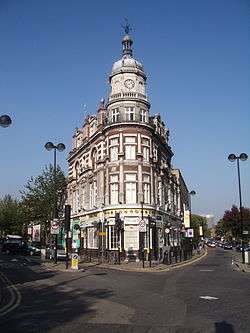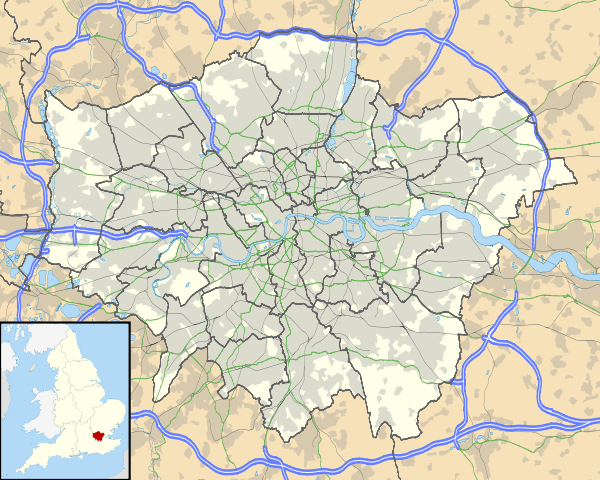Tufnell Park
Coordinates: 51°33′25″N 0°08′02″W / 51.557°N 0.134°W
Tufnell Park is an area of north London, England which straddles the border of the London Borough of Islington and the London Borough of Camden.
History
Origins
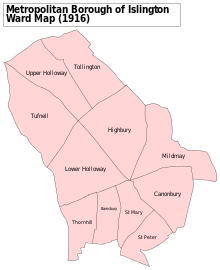
Tufnell Park Road runs along the line of an old Roman road which stretches from the Roman camp beneath Barclays Bank and Batten's Carpets on the Holloway Road, up Dartmouth Hill and over Hampstead Heath.[1] For centuries the area was renowned for its dairy farms which kept London and the south supplied with milk.
It kept a rural air well into the 19th century in its important role as a base for a number of dairies supplying the capital. In 1753 the area became the property of William Tufnell who was granted the manor of Barnsbury by his father-in-law Sir William Halton. The manor (now demolished) stood on the site of the Holloway Odeon. The manor's gateposts can still be seen, however, towards the west end of Tufnell Park Road. Tufnell petitioned the Parliament for permission to develop his estate but the leases he was granted were left unused. William's father was Samuel Tufnell of Langleys in Essex. William also inherited Nun Monkton in Yorkshire and estates in Northumberland from his great-uncle, Nathaniel Payler. He also inherited Pleshy from his godfather William Joliffe. These estates went to his older brother John Jolliffe Tufnell of Langleys.
The Tufnell Park estate passed to his brother George Foster Tufnell, MP for Beverley (d 1798), then to George's son William Tufnell (d 1809), MP for Colchester, who married in 1804 into a fortune owned by Mary Carleton (daughter of Thomas Carleton of South Carleton d.1829). Both are buried at St Mary’s Islington, hence her maiden name appearing as two street names in N7. William was the brother of Lt. Col. John Charles Tufnell of Bath (leased Lackham House, Lacock in Wiltshire in 1817), banker, m. 1796 Uliana Ivanova Margaret Fowell (d. 29/1/1848) daughter of John Fowell of Bishopbourne). They had 18 children, one of whom was Edward Wyndam Tufnell, the first Bishop of Brisbane.
The manor then passed to Henry Tufnell (d 1854), MP for Ipswich and Devonport, Liberal chief whip, Lord of the Treasury, m. Anne Augusta Wilmot-Horton (daughter of the Governor of Ceylon d.17/9/1843), m. 2 1844 Frances Byng (daughter of Sir John Byng Earl of Stafford, d. 1846), m.3. 1848 Lady Anne Primrose (daughter of Earl of Rosebery, d. 1862)
The estate then passed to Henry Archibald Tufnell (d 1898) who died with no children, and then to Lt Col Edward Tufnell (d 1909) HM Inspector of Schools, Factory Commissioner, Director Greenwich Hospital m. 1846 Honoria Mary Macadam (daughter of Col. Macadam Knight of Hanover, d.1877)
Development
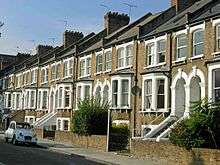
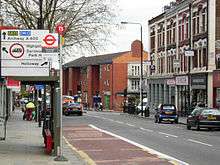
Serious building began in 1845 with a scheme sponsored by Henry Tufnell and designed by John Shaw Jr, who had laid out the Eton Estate in Chalk Farm. This initial work was largely limited to the area around Carleton Road. In 1865 the scheme was taken up by George Truefitt who developed most of the local villas and St. George's Church (1865), built for Anglican secessionists. The housing stock was of a solid nature, and Tufnell Park kept its good name until the end of the century. Charles Booth in his survey of London Life and Labour reported that the older streets (Anson Road and Carleton Road) housed a mixture of retired merchants and music hall artistes who were rich enough to holiday abroad over winter. He believed that second wave of building around Celia, Hugo, Corinne, Huddleston and Archibald Roads threatened to create a metropolis "from which the rich would soon be going". The private girls' school established at the corner of Carleton and Brecknock Roads was closed in 1878 after many of its pupils drowned in the Princess Alice disaster.
Tufnell Park was more fortunate than several of its neighbours. Whereas roads and railway lines were sliced through Kentish Town and Camden in the 19th century, they mostly passed through Tufnell Park in tunnel, and Junction Road railway station provided a direct link with central London. The shabby genteel reputation of Tufnell Park made it a standard comic reference in the nineteenth and twentieth centuries. George and Weedon Grossmith locate their aspirational Mr Pooter in Tufnell Park (Upper Holloway) in Diary of a Nobody. Julian and Sandy, the camp characters in the Round the Horne radio series, frequently referenced Tufnell Park.
Geography
 |
Dartmouth Park | Archway | Crouch End |  |
| Gospel Oak | |
Upper Holloway | ||
| ||||
| | ||||
| Chalk Farm | Kentish Town | Holloway |
Notable residents
- Writer Clive James spent a large part of his early life in Britain living in Tufnell Park, and describes in detail his disdain for it in his book Falling Towards England.
- Dr Crippen lived at 39 Hilldrop Crescent in Tufnell Park (now demolished), where he murdered his wife.
- Actor Shazad Latif
- Activist and Green Party London Assembly member Sian Berry
- Actor Ben Miller
- Actor Bill Nighy
- Actor Christopher Lee
- Actor Damian Lewis
- Former MP and leader of the Labour Party Neil Kinnock, Baron Kinnock of Beddwellty
- Former MEP Glenys Kinnock
- MP and leader of the Labour Party, Jeremy Corbyn
- MP Tessa Jowell
- Peer Baroness Pitkeathley
- Musician Jonny Buckland
- Actress Cathy Tyson
- Actress Helen McCrory
- Singer Suggs
- Academic and writer Professor Philip Tew lived in Tufnell Park 1988–2009.
- Snooker commentator Jack Karnehm was born here)
- Robert Muchamore, author of bestselling young adult series CHERUB and Henderson's Boys
- Director Roger Michell
- Comedian and Author Charlie Higson
- Composer, Singer and Song Writer A.R.Rahman
- DJ Zane Lowe
- Presenter Gavin Esler
- Presenter Jon Snow
- Actor Michael Garner
- Actor William Gaminara
- Singer and X Factor finalist Sophie Habibis
- Painter Fermin Rocker
- Actress Laura Carmichael
- Joe Craig author of the bestselling Jimmy Coates series
Transport
The nearest London Underground station is Tufnell Park on the Northern line.
The nearest London Overground stations are Upper Holloway and Gospel Oak
References
- ↑ Islington: Growth: Holloway and Tollington, A History of the County of Middlesex: Volume 8: Islington and Stoke Newington parishes (1985), pp. 29-37. URL: http://www.british-history.ac.uk/report.aspx?compid=1374. Date accessed: Friday, 12 October 2007.
